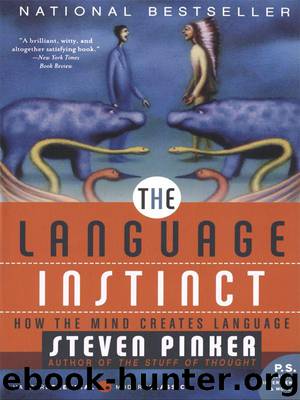The Language Instinct: How The Mind Creates Language (P.S.) by Pinker Steven

Author:Pinker, Steven [Pinker, Steven]
Language: eng
Format: mobi, azw3
Publisher: Harper Collins, Inc.
Published: 2010-12-13T16:00:00+00:00
There is a very good reason why the erotic side of Man has called forth so much more discussion lately than has his appetite for food. The reason is this: that while the urge to eat is a personal matter which concerns no one but the person hungry (or, as the German has it, der hungrige Mensch), the sex urge involves, for its true expression, another individual. It is this “other individual” that causes all the trouble.
Though speech input is necessary for speech development, a mere soundtrack is not sufficient. Deaf parents of hearing children were once advised to have the children watch a lot of television. In no case did the children learn English. Without already knowing the language, it is difficult for a child to figure out what the characters in those odd, unresponsive televised worlds are talking about. Live human speakers tend to talk about the here and now in the presence of children; the child can be more of a mind-reader, guessing what the speaker might mean, especially if the child already knows many content words. Indeed, if you are given a translation of the content words in parents’ speech to children in some language whose grammar you do not know, it is quite easy to infer what the parents meant. If children can infer parents’ meanings, they do not have to be pure cryptographers, trying to crack a code from the statistical structure of the transmissions. They can be a bit more like the archeologists with the Rosetta Stone, who had both a passage from an unknown language and its translation in a known one. For the child, the unknown language is English (or Japanese or Inslekampx or Arabic); the known one is mentalese.
Another reason why television soundtracks might be insufficient is that they are not in Motherese. Compared with conversations among adults, parents’ speech to children is slower, more exaggerated in pitch, more directed to the here and now, and more grammatical (it is literally 99 and 44/100ths percent pure, according to one estimate). Surely this makes Motherese easier to learn than the kind of elliptical, fragmentary conversation we saw in the Watergate transcripts. But as we discovered in Chapter 2, Motherese is not an indispensable curriculum of Language-Made-Simple lessons. In some cultures, parents do not talk to their children until the children are capable of keeping up their end of the conversation (though other children might talk to them). Furthermore, Motherese is not grammatically simple. That impression is an illusion; grammar is so instinctive that we do not appreciate which constructions are complex until we try to work out the rules behind them. Motherese is riddled with questions containing who, what, and where, which are among the most complicated constructions in English. For example, to assemble the “simple” question What did he eat?, based on He ate what, one must move the what to the beginning of the sentence, leaving a “trace” that indicates its semantic role of “thing eaten,” insert the meaningless
Download
The Language Instinct: How The Mind Creates Language (P.S.) by Pinker Steven.azw3
This site does not store any files on its server. We only index and link to content provided by other sites. Please contact the content providers to delete copyright contents if any and email us, we'll remove relevant links or contents immediately.
Cecilia; Or, Memoirs of an Heiress — Volume 1 by Fanny Burney(32536)
Cecilia; Or, Memoirs of an Heiress — Volume 2 by Fanny Burney(31934)
Cecilia; Or, Memoirs of an Heiress — Volume 3 by Fanny Burney(31925)
The Lost Art of Listening by Michael P. Nichols(7485)
Asking the Right Questions: A Guide to Critical Thinking by M. Neil Browne & Stuart M. Keeley(5751)
We Need to Talk by Celeste Headlee(5604)
On Writing A Memoir of the Craft by Stephen King(4924)
Dialogue by Robert McKee(4385)
Pre-Suasion: A Revolutionary Way to Influence and Persuade by Robert Cialdini(4213)
I Have Something to Say: Mastering the Art of Public Speaking in an Age of Disconnection by John Bowe(3871)
Elements of Style 2017 by Richard De A'Morelli(3336)
The Book of Human Emotions by Tiffany Watt Smith(3289)
Fluent Forever: How to Learn Any Language Fast and Never Forget It by Gabriel Wyner(3074)
Name Book, The: Over 10,000 Names--Their Meanings, Origins, and Spiritual Significance by Astoria Dorothy(2969)
Why I Write by George Orwell(2944)
Good Humor, Bad Taste: A Sociology of the Joke by Kuipers Giselinde(2939)
The Art Of Deception by Kevin Mitnick(2785)
The Grammaring Guide to English Grammar with Exercises by Péter Simon(2733)
Ancient Worlds by Michael Scott(2675)
